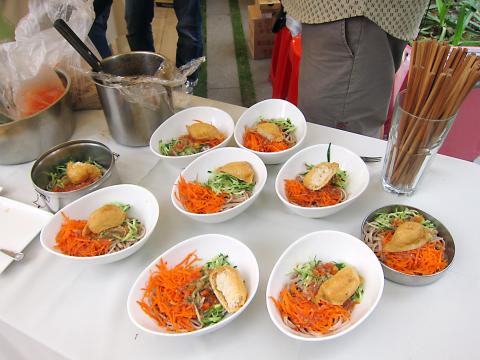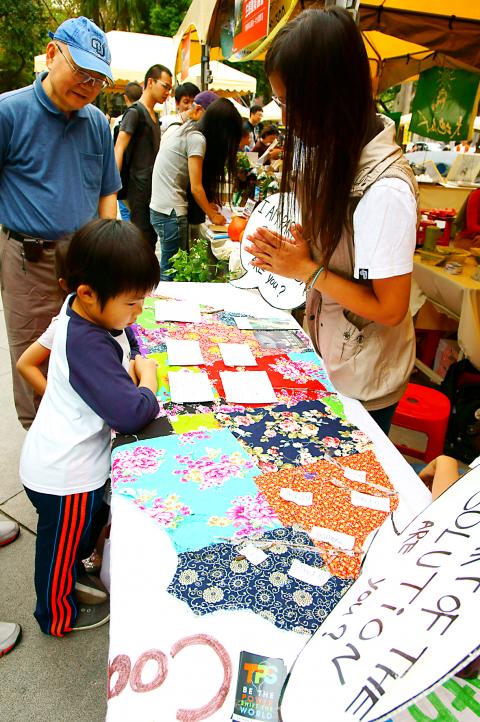Forty-five years after it was launched in the US, Earth Day, whose official day is Wednesday, has grown to become a global environmental movement, drawing more than one billion participants around the world each year.
Organized by the non-profit Taiwan Environmental Information Association (TEIA, 台灣環境資訊協會), the theme for this year’s Earth Day Taiwan (台灣地球日) is “It’s Our Turn to Lead.” The five-day series of events will include lectures, exhibitions, outdoor fairs and beach cleanups.
Tomorrow and Sunday, around 50 companies, organic growers, artists and NGOs will participate in a green fair set to take place at the National Taiwan Museum (國立臺灣博物館), 2 Xiangyang Rd, Taipei City (台北市襄陽路2號), and Nanmen Park (南門園區), 1, Nanchang Rd Sec 1, Taipei City (台北市南昌路一段1號).

Photo courtesy of TEIA
There will be a farmers’ market, and an arts and crafts section consisting of businesses working with green designs, innovative ideas and sustainable products. The organizers are encouraging people to bring used or unwanted goods from home to trade with others. Participating enterprises include donation platforms iGoods (愛物資) and Secharity Shop (社企市集).
Speakers will discuss various topics such as clean energy, sustainable fashion and urban greening, while the performance lineup includes the Village Armed Youth (農村武裝青年), Amis songstress Ilid Kaolo (以莉·高露) and Jimmy Wang (王俊傑), a visually impaired Hoklo musician.
In addition, there will be a screening of 14 documentary and animated films. Multi-award winning Gasland examines how natural gas drilling in the US has affected local communities, contaminating their water wells and air. The Last Ocean reveals how the Ross Sea in Antarctica, one of the last places on Earth largely untouched by humans, is now exploited by international fishing fleets. Children of the Earth (大地的孩子 — 小石虎返家之路) raises public awareness of the conservation of protected leopards through the life of two kittens.

Photo courtesy of TEIA
Both film screenings and music performances are set to take place tomorrow and on Sunday at Nanmen Park. Admission is free. There will be another round of similar events taking place from Monday to Wednesday. For more information, go to Earth Day Taiwan’s Web site at www.earthday.org.tw.

May 11 to May 18 The original Taichung Railway Station was long thought to have been completely razed. Opening on May 15, 1905, the one-story wooden structure soon outgrew its purpose and was replaced in 1917 by a grandiose, Western-style station. During construction on the third-generation station in 2017, workers discovered the service pit for the original station’s locomotive depot. A year later, a small wooden building on site was determined by historians to be the first stationmaster’s office, built around 1908. With these findings, the Taichung Railway Station Cultural Park now boasts that it has

Wooden houses wedged between concrete, crumbling brick facades with roofs gaping to the sky, and tiled art deco buildings down narrow alleyways: Taichung Central District’s (中區) aging architecture reveals both the allure and reality of the old downtown. From Indigenous settlement to capital under Qing Dynasty rule through to Japanese colonization, Taichung’s Central District holds a long and layered history. The bygone beauty of its streets once earned it the nickname “Little Kyoto.” Since the late eighties, however, the shifting of economic and government centers westward signaled a gradual decline in the area’s evolving fortunes. With the regeneration of the once

In February of this year the Taipei Times reported on the visit of Lienchiang County Commissioner Wang Chung-ming (王忠銘) of the Chinese Nationalist Party (KMT) and a delegation to a lantern festival in Fuzhou’s Mawei District in Fujian Province. “Today, Mawei and Matsu jointly marked the lantern festival,” Wang was quoted as saying, adding that both sides “being of one people,” is a cause for joy. Wang was passing around a common claim of officials of the People’s Republic of China (PRC) and the PRC’s allies and supporters in Taiwan — KMT and the Taiwan People’s Party — and elsewhere: Taiwan and

Even by the standards of Ukraine’s International Legion, which comprises volunteers from over 55 countries, Han has an unusual backstory. Born in Taichung, he grew up in Costa Rica — then one of Taiwan’s diplomatic allies — where a relative worked for the embassy. After attending an American international high school in San Jose, Costa Rica’s capital, Han — who prefers to use only his given name for OPSEC (operations security) reasons — moved to the US in his teens. He attended Penn State University before returning to Taiwan to work in the semiconductor industry in Kaohsiung, where he